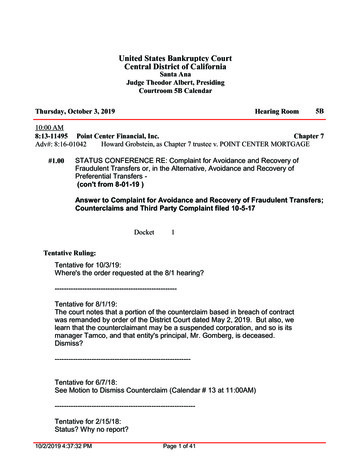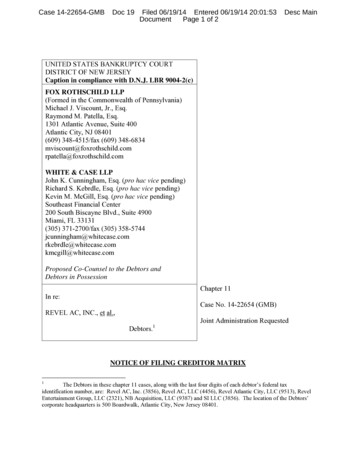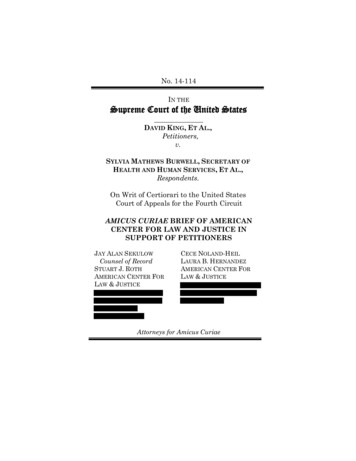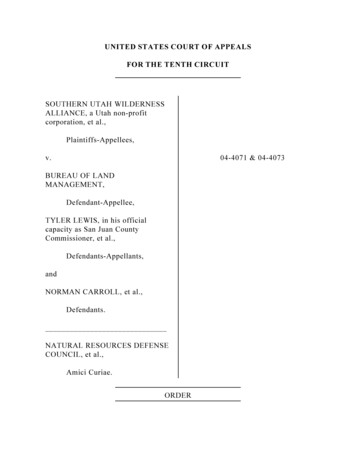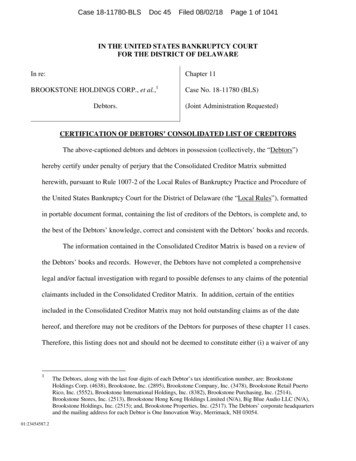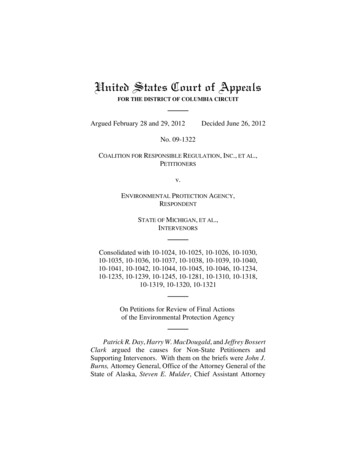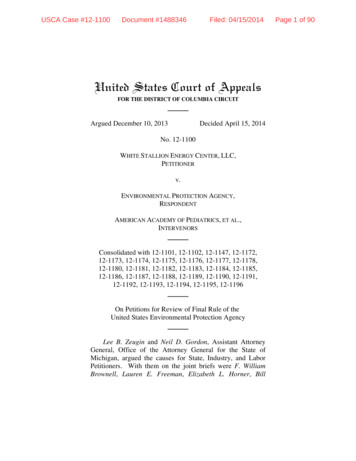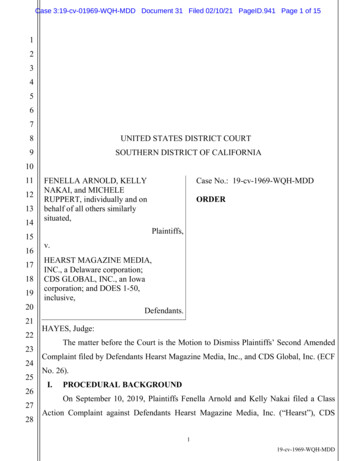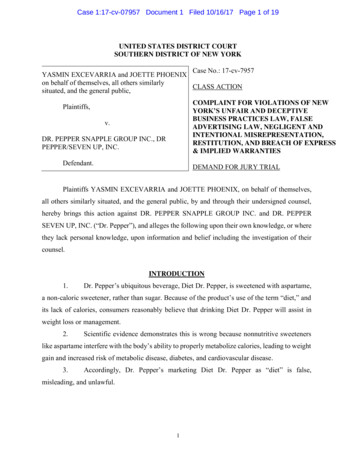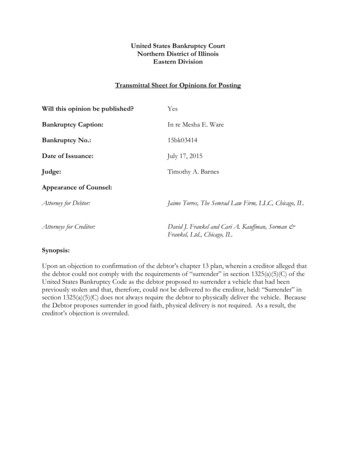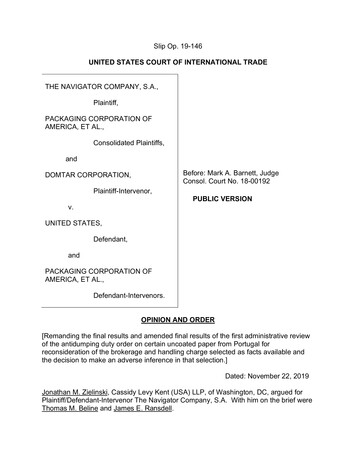
Transcription
Slip Op. 19-146UNITED STATES COURT OF INTERNATIONAL TRADETHE NAVIGATOR COMPANY, S.A., Plaintiff,PACKAGING CORPORATION OFAMERICA, ET AL., Consolidated Plaintiffs,andBefore: Mark A. Barnett, JudgeConsol. Court No. 18-00192DOMTAR CORPORATION, Plaintiff-Intervenor,PUBLIC VERSIONv.UNITED STATES, Defendant,andPACKAGING CORPORATION OFAMERICA, ET AL., Defendant-Intervenors.OPINION AND ORDER[Remanding the final results and amended final results of the first administrative reviewof the antidumping duty order on certain uncoated paper from Portugal forreconsideration of the brokerage and handling charge selected as facts available andthe decision to make an adverse inference in that selection.]Dated: November 22, 2019Jonathan M. Zielinski, Cassidy Levy Kent (USA) LLP, of Washington, DC, argued forPlaintiff/Defendant-Intervenor The Navigator Company, S.A. With him on the brief wereThomas M. Beline and James E. Ransdell.
Consol. Court No. 18-00192Page 2Geert De Prest, Schagrin Associates, of Washington, DC, argued forPlaintiff/Defendant-Intervenor Packaging Corporation of America, et al. With him on thebrief were Terence P. Stewart, William A. Fennell, and Lane S. Hurewitz, Stewart andStewart, of Washington, DC.Stephen J. Orava and Daniel L. Schneiderman, King & Spalding LLP, of Washington,DC, for Plaintiff-Intervenor Domtar Corporation.Patricia M. McCarthy, Assistant Director, Commercial Litigation Branch, Civil Division,U.S. Department of Justice, of Washington, DC, argued for Defendant United States.With her on the brief were Joseph H. Hunt, Assistant Attorney General, Jeanne E.Davidson, Director, Tara K. Hogan, Assistant Director, and Michael D. Snyder, TrialAttorney. Of counsel was Mykhaylo A. Gryzlov and Brendan Saslow, Attorney, Office ofthe Chief Counsel for Trade Enforcement and Compliance, U.S. Department ofCommerce, of Washington, DC.Barnett, Judge: This consolidated action is before the court on two motions forjudgment on the agency record challenging the final results and amended final results ofthe U.S. Department of Commerce’s (“Commerce” or the “agency”) first administrativereview of the antidumping duty order on certain uncoated paper from Portugal.1 SeeCertain Uncoated Paper From Portugal, 83 Fed. Reg. 39,982 (Dep’t Commerce Aug.13, 2018) (final results of antidumping duty admin. review; 2015–2017) (“Final Results”),ECF No. 33-2, and accompanying Issues and Decision Mem., A-471-807 (Aug. 6, 2018)(“I&D Mem.”), ECF No. 33-3; Certain Uncoated Paper From Portugal, 83 Fed. Reg.52,810 (Dep’t Commerce Oct. 18, 2018) ([am.] final results of antidumping duty admin.review; 2015–2017) (“Amended Final Results”), ECF No. 33-1, and accompanyingConfidential Ministerial Error Mem. (Oct. 9, 2018) (“Min. Error Mem.”), ECF No. 65-1.1The administrative record for this case is divided into a Public Administrative Record(“PR”), ECF No. 33-4, and a Confidential Administrative Record (“CR”), ECF No. 33-5,20-3. Parties submitted joint appendices containing record documents cited in theirbriefs. See Public J.A. (“PJA”), ECF No. 73; Confidential J.A. (“CJA”), ECF No. 74. Thecourt references the confidential version of the relevant record documents, unlessotherwise specified.
Consol. Court No. 18-00192Page 3Consolidated Plaintiffs, Packaging Corporation of America and United Steel,Paper and Forestry, Rubber, Manufacturing, Energy, Allied Industrial and ServiceWorkers International Union, AFL-CIO, CLC (“USW”), and Plaintiff-Intervenor DomtarCorporation (collectively, “Petitioners”) challenge Commerce’s decision to amend theFinal Results to correct an alleged ministerial error. Specifically, Petitioners argue thatin adopting the Amended Final Results, Commerce: (1) departed from its practice ofusing data initially rejected as unreliable when selecting the facts available with anadverse inference, (2) altered the substance of the Final Results rather than correctinga ministerial error, and (3) chose an insufficiently adverse value for Navigator’s U.S.brokerage expenses. See Rule 56.2 Mot. of Consol. Pls.’ Packaging Corp. of Americaand USW and Pl.-Int. Domtar Corp. for J. on the Agency R., ECF No. 47, andConfidential Mem. of Law in Supp. of Rule 56.2 Mot. of Consol. Pls. Packaging Corp. ofAmerica and USW and Pl.-Int. Domtar Corp. for J. on the Agency R. (“Pet’rs’ Mem.”),ECF No. 48.Plaintiff, The Navigator Company, S.A. (“Navigator”), challenges the FinalResults, arguing that: (1) there is no gap in the record which would allow Commerce toresort to facts available pursuant to 19 U.S.C. § 1677e(a); (2) Commerce failed tocomply with the requirements of 19 U.S.C. § 1677m(d) by not providing Navigator withsufficient opportunity to explain any deficiencies in its response; and (3) Commerce hadno basis for making an adverse inference pursuant to 19 U.S.C. § 1677e(b). TheNavigator Company’s Mot. for J. on the Agency R. (“Navigator’s Mot.”), ECF No. 50,and Mem. of Points of Law and Fact in Supp. of the Rule 56.2 Mot. for J. on the AgencyR. filed by Pl., The Navigator Company (“Navigator’s Mem.”), ECF No. 50.
Consol. Court No. 18-00192Page 4For the reasons discussed below, the court remands the Final Results andAmended Final Results for Commerce to reconsider its use of an adverse inference andselection of facts available for Navigator’s allocated U.S. brokerage and handlingexpenses.JURISDICTION AND STANDARD OF REVIEWThe court has jurisdiction pursuant to section 516A(a)(2)(B)(iii) of the Tariff Act of1930, as amended, 19 U.S.C. § 1516a(a)(2)(B)(iii) (2012),2 and 28 U.S.C. § 1581(c).The court will uphold an agency determination that is supported by substantial evidenceand otherwise in accordance with law. 19 U.S.C. § 1516a(b)(1)(B)(i).BACKGROUNDOn March 3, 2016, Commerce published an antidumping duty order on uncoatedpaper from Portugal. Certain Uncoated Paper From Australia, Brazil, Indonesia, thePeople’s Republic of China, and Portugal, 81 Fed. Reg. 11,174 (Dep’t Commerce Mar.3, 2016) (am. final affirmative antidumping determinations and antidumping dutyorders). On March 31, 2017, Navigator requested an administrative review of itsimports for the period of review (“POR”) of August 26, 2015 through February 28, 2017(“POR”). Req. for Admin. Review of Antidumping Duty Order (Mar. 31, 2017), PR 1,2All citations to the Tariff Act of 1930, as amended, are to Title 19 of the U.S. Code,and references to the U.S. Code are generally to the 2012 edition. However, the TradePreferences Extension Act (“TPEA”), Pub. L. No. 114–27, § 502, 129 Stat. 362, 383–84(2015), made several amendments to the antidumping and countervailing duty laws.Section 502 of the TPEA amended 19 U.S.C. § 1677e. See TPEA § 502. The TPEAamendments affect all antidumping duty determinations made on or after August 6,2015. See Dates of Application of Amendments to the Antidumping and CountervailingDuty Laws Made by the Trade Preferences Extension Act of 2015, 80 Fed. Reg. 46,793(Dep’t Commerce Aug. 6, 2015). Accordingly, all references to 19 U.S.C. § 1677e areto the amended version of the statute.
Consol. Court No. 18-00192Page 5PJA Tab 1 . Commerce initiated this review on May 9, 2017. Initiation of Antidumpingand Countervailing Duty Admin. Reviews, 82 Fed. Reg. 21,513 (Dep’t Commerce May9, 2017). Commerce published the preliminary results of review on April 6, 2018,preliminarily calculating a zero percent dumping margin for Navigator. Uncoated PaperFrom Portugal, 83 Fed. Reg. 14,844 (Dep’t Commerce Apr. 6, 2018) (prelim. results ofantidumping duty admin. review; 2015–2017) (“Preliminary Results”).On August 13, 2018, Commerce published the Final Results, pursuant to whichthe agency found that certain U.S. brokerage and handling expenses, as reported byNavigator, were anomalous and effectively increased the net price for U.S. sales ofsubject merchandise during the POR. See Final Results, 83 Fed. Reg. at 39,983; I&DMem. at 6–8. Commerce explained that Navigator “reported U.S. brokerage andhandling in two fields, USBROKU and USBROK2U, where the amounts reported inUSBROKU were actual expenses and the amounts reported in USBROK2U wereallocated.” I&D Mem. at 7 & n.36 (citation omitted). Regarding the allocated expensesreported in USBROK2U (or “allocated brokerage expenses”), Commerce found thatNavigator “failed to cooperate to the best of its ability because it failed to provide thenecessary information demonstrating that its allocation methodology . . . [did] not causeinaccuracies or distortions.” Id. at 8. Commerce selected the highest reported allocatedbrokerage expense as adverse facts available (“AFA”) for Navigator’s allocatedbrokerage and handling expenses. Id. at 8 & n.43 (citing Final Results Analysis Mem.for The Navigator Company, S.A. (Aug. 6, 2018) (“Navigator Final Analysis Mem.”), CR310, CJA Tab 8). In the Final Results, Navigator’s weighted-average dumping marginincreased to 37.34 percent. 83 Fed. Reg. at 39,983.
Consol. Court No. 18-00192Page 6Also on August 13, 2018, Navigator timely submitted a ministerial error allegationin which it argued, in relevant part, that Commerce made a ministerial error when itselected the highest allocated brokerage expense to use as partial AFA “because itmathematically resulted in a larger brokerage expense than Commerce otherwise foundto be a reliable total brokerage expense” and resulted in an unrealistically high totalbrokerage expense. Ministerial Error Allegation (Aug. 13, 2018) at 8, CR 320, CJA Tab9.On August 27, 2018, Navigator initiated this action challenging the Final Results.Summons, ECF No. 1; Compl., ECF No. 6. After consultation with interested parties,Commerce requested leave to consider Navigator’s ministerial error allegations. Def.’sConsent Mot. for Leave to Consider Ministerial Error Allegation and, if Necessary, toPublish Am. Final Results or Correction Notice, ECF No. 13. The court granted suchleave on September 7, 2018. Order (Sept. 7, 2018), ECF No. 14.On October 9, 2018, Commerce issued a memorandum addressing the allegedministerial errors. Min. Error Mem.; see also Amended Final Results, 83 Fed. Reg.52,810. Commerce agreed that it had made a ministerial error by selecting Navigator’shighest allocated brokerage expense as adverse facts available and, instead, selectedthe highest transaction specific U.S. brokerage expense (reported in USBROKU) toreplace Navigator’s allocated brokerage expense. Min. Error Mem. at 6, 7. Thischange reduced Navigator’s weighted-average dumping margin from 37.34 to 1.75percent. Id. at 6; Am. Final Determinations Calculations for The Navigator Company,S.A. (Oct. 9, 2018) (“Amended Calc. Mem.”) at 2, CR 323, CJA Tab 12.
Consol. Court No. 18-00192Page 7Commerce issued its Amended Final Results on October 18, 2018. AmendedFinal Results, 83 Fed. Reg. at 52,810. On October 22, 2018, Consolidated Plaintiffsinitiated a separate action challenging the Amended Final Results. PackagingCorporation of America, et al. v. United States, et al., No. 1:18-cv-00217, Summons,ECF No. 1, Compl., ECF No. 7 (CIT Oct. 22, 2018). On November 1, 2018, the courtconsolidated the actions under lead court number 18-00192. Docket Order, ECF No.34.DISCUSSIONWhile Navigator challenges Commerce’s determination to use adverse factsavailable and its selection of adverse facts available in the Final Results, subsequent tothe issuance of the Amended Final Results, Navigator has stated that it would waive itsright to pursue its challenge if Petitioners do not prevail in their challenge to theAmended Final Results. See Navigator’s Mot. at 3. In light of the contingent nature ofNavigator’s challenge, the court will first consider Petitioners’ challenge to the AmendedFinal Results.I. Petitioners’ Challenges to the Amended Final ResultsA. Legal FrameworkPursuant to 19 U.S.C. § 1675(h), Commerce is authorized to correct ministerialerrors in its final determinations and required to establish procedures for correction ofsuch errors.3 See also Zenith Elecs. Corp. v. United States, 884 F.2d 556, 560 (Fed.3Section 1675(h) provides:The administering authority shall establish procedures for the correctionof ministerial errors in final determinations within a reasonable timeafter the determinations are issued under this section. Such procedures
Consol. Court No. 18-00192Page 8Cir. 1989) (“A number of cases have recognized the authority of an administrativeagency to correct inadvertent, ministerial errors.” (collecting cases)). Both statute andregulation define “ministerial error” as “an error in addition, subtraction, or otherarithmetic function, clerical error resulting from inaccurate copying, duplication, or thelike, and any other type of unintentional error which the [agency] considers ministerial.”19 U.S.C. § 1675(h); cf. 19 C.F.R. § 351.224(f). “Clerical errors are by their nature noterrors in judgment but mere inadvertencies.” NTN Bearing Corp. v. United States, 74F.3d 1204, 1208 (Fed. Cir. 1995); see also SGL Carbon LLC v. United States, 36 CIT264, 275 , 819 F. Supp. 2d 1352, 1363 (2012) (finding that ministerial errors are notthose “resulting from ill-considered judgment or wayward discretion”) (citation omitted).This court has repeatedly recognized the existence of a legal distinction betweenministerial and non-ministerial errors.4“Commerce is given fairly broad discretion to determine which types ofunintentional error to regard as ministerial.” CEMEX, S.A. v. United States, 19 CIT 587,593 (1995) (citing 19 U.S.C. § 1675(h)). However, Commerce’s determination is notwithout limits and is subject to judicial review. See Alloy Piping Prod., Inc. v. KanzenTetsu Sdn. Bhd., 334 F.3d 1284, 1292 (Fed. Cir. 2003) (noting that Commerce hasshall ensure opportunity for interested parties to present their viewsregarding any such errors.19 U.S.C. § 1675(h)4See, e.g., Peer Bearing Co. v. United States, 23 CIT 454, 458, 57 F. Supp. 2d 1200,1204 (1999) (“[T]he allegation of faulty judgment inherently falls outside the purview of aministerial error.”); Shinhan Diamond Indus. Co., Ltd. v. United States, 34 CIT 227, 231(2010) (“[A] ministerial error ‘encompasses only errors mechanical in nature, apparenton the record, and not involving an error of substantive judgment,’ or includes only‘mindless and mechanistic mistakes [and] minor shifting of facts.’”) (citation omitted)(second alteration in original).
Consol. Court No. 18-00192Page 9discretion to determine when an alleged error is ministerial, but Commerce’sdeterminations thereto are “subject to judicial review”); Hor Liang Indus. Corp. v. UnitedStates, 42 CIT , , 337 F. Supp. 3d 1310, 1321 (2018) (same).B. Commerce’s DeterminationsAs stated above, for the Final Results, Commerce selected the highest reportedallocated brokerage expense reported in USBROK2U as AFA.5 See I&D Mem. at 8.Commerce explained that Navigator’s transaction specific brokerage expenses were notappropriate to use as AFA for Navigator’s allocated brokerage expenses because“these observations with transaction specific . . . [expenses] represent a [limited] portionof [Navigator’s] total . . . observations and are not sold pursuant to the same salesprocess as those observations with an allocated U.S. brokerage and handling expensereported.”6 Navigator Final Analysis Mem. at 6. For that reason, Commerce found thatthose observations for which Navigator reported actual expenses were notrepresentative of the sales for which Navigator allocated its expenses. Id.In the Ministerial Error Memorandum, Commerce stated that it had erred in usingNavigator’s highest allocated brokerage expenses as AFA because the agency hadSpecifically, Commerce selected [[]] U.S. dollars per kilogram as adverse factsavailable to use for allocated brokerage expenses. Navigator Final Analysis Mem. at 6.6In its section C questionnaire response, Navigator explained that “[t]he expensesreported in field USBROKU are direct in nature and apply to [[5]]” Navigator’s Sec. C Questionnaire Resp. (June15, 2017) (“Navigator CQR”) at 33, PR 25, CR 22, 28, 29, 44, CJA Tab 2. Forexpenses reported in USBROK2U, “[[]] and, [thus], thetraceability is lost.” Id. at 34. Accordingly, for sales reported in USBROK2U, Navigatorallocated its brokerage expenses “based on the total quantity of individual productcodes purchased by individual customers.” Id.
Consol. Court No. 18-00192Page 10found that information to be unreliable. Min. Error Mem. at 6 & n.33 (referring to itsfinding that Navigator had failed to show that its allocation methodology did “not causeinaccuracies or distortions”) (quoting I&D Mem. at 8). Commerce stated that it did “notknow the full universe of inaccuracies or distortions associated with [the highestallocated brokerage] expense,” and its selection of that value as AFA was, therefore, an“unintentional ministerial error.” Id. at 6. To correct this error, Commerce selectedNavigator’s highest transaction specific expense as AFA.7 Id.C. Parties’ ContentionsPetitioners contend that Commerce’s decision to change its choice of AFA valuein the Amended Final Results was not the correction of a ministerial error, but asubstantive change that exceeded the scope of the court’s Order granting permission toconsider the ministerial error allegation. Pet’rs’ Mem. at 19-20.The Government contends that Commerce corrected a ministerial error becauseit initially selected Navigator’s highest reported allocated brokerage expense as AFA,after it had determined that the allocated data provided by Navigator was unreliable.Confidential Def.’s Opp’n to Pl.’s Mot. for J. Upon the Agency R. (“Gov’t’s Resp.”), at 16,ECF No. 57. The Government argues that Commerce has broad discretion todetermine what type of errors qualify as “ministerial.” Id. at 20.Navigator supports the Government’s contention that Commerce acted within itsdiscretion by treating its selection of the AFA value as a ministerial error. ConfidentialThe Navigator Company’s Resp. in. Opp’n To Consol. Pls.’ and Pl.-Int.’s Mot. for J. onSpecifically, Commerce selected [[]] U.S. dollars per kilogram in the AmendedFinal Results to use as adverse facts available for allocated brokerage expenses inUSBROK2U. Amended Calc. Mem. at 3.7
Consol. Court No. 18-00192Page 11the Agency R. (“Navigator’s Resp.”) at 6–11, ECF No. 61. Navigator points to thelegislative history of 19 U.S.C. § 1675(h) to show that Congress intended to grantCommerce a wide degree of discretion in deciding which types of errors are“ministerial.” Id. at 7–8.D. Commerce Made a Substantive Modification to the Final ResultsCommerce has broad, but not unbounded, discretion to determine which types oferrors are ministerial. See, e.g., Hor Liang Indus., 337 F. Supp. 3d at 1321; SGLCarbon, 36 CIT at 273, 819 F. Supp. 2d at 1362. In this case, Commerce exceeded itsauthority when it claimed to correct a ministerial error when revising its selection of AFAfor the allocated brokerage. Ministerial errors “are by their nature not errors in judgmentbut merely inadvertencies.” NTN Bearing, 74 F.3d at 1207.The Government cites several cases supporting Commerce’s discretion toidentify and correct ministerial errors, including Peer Bearing , 23 CIT 454, 57 F. Supp.2d 1200. See Gov’t’s Resp. at 20. While Commerce does have significant discretion,the facts underlying Peer Bearing support the conclusion that Commerce exceeded itsdiscretion here.8 In Peer Bearing, the court held that Commerce made a ministerialerror when it “accidentally used an unskilled labor rate of 46.6 Rupees per hour and a8Navigator errs in suggesting that the court must give Chevron deference toCommerce’s ministerial error finding. Navigator’s Resp. at 7–8 (citing Chevron, 467U.S. at 842–43); see also id. at 10 (“Commerce’s Amended Final Results set forth areasonable construction of the statute . . . .”). Whether Commerce corrected aministerial error does not concern the agency’s
orders). On March 31, 2017, Navigator requested an administrative review of its imports for the period of review (“POR”) of August 26, 2015 through February 28, 2017 (“POR”). Req. for Admin. Review of Antidumping Duty Order (Mar. 31, 2017), PR 1, 2 All citations to the Tariff A

